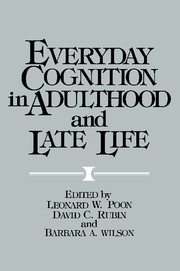Book contents
- Frontmatter
- Contents
- List of contributors
- Preface
- Part I Adult cognitive abilities in the laboratory and in real-life settings: Basic theoretical and methodological issues
- Part IA Systematic approaches to laboratory and real-world research
- Part IB Combining laboratory and real-world research
- Part II Cognition in adulthood and late life: Findings in real-life settings
- Part IIA Everyday cognitive abilities
- Part IIB Concomitant influences
- Part III Cognitive enhancement and aging: Clinical and educational applications
- Part IIIA Issues and perspectives
- Part IIIB Enhancement approaches
- 30 Planning practical memory training for the aged
- 31 Mnemonics as modified for use by the elderly
- Part IIIC Designing programs for cognitive rehabilitation
- Subject index
- Author index
30 - Planning practical memory training for the aged
Published online by Cambridge University Press: 05 October 2013
- Frontmatter
- Contents
- List of contributors
- Preface
- Part I Adult cognitive abilities in the laboratory and in real-life settings: Basic theoretical and methodological issues
- Part IA Systematic approaches to laboratory and real-world research
- Part IB Combining laboratory and real-world research
- Part II Cognition in adulthood and late life: Findings in real-life settings
- Part IIA Everyday cognitive abilities
- Part IIB Concomitant influences
- Part III Cognitive enhancement and aging: Clinical and educational applications
- Part IIIA Issues and perspectives
- Part IIIB Enhancement approaches
- 30 Planning practical memory training for the aged
- 31 Mnemonics as modified for use by the elderly
- Part IIIC Designing programs for cognitive rehabilitation
- Subject index
- Author index
Summary
It is a challenge to address the practical memory needs of older individuals, because psychologists know little about the daily memory demands faced by older adults or the strategies they use to cope with these demands. Recent efforts to investigate “ecological” memory performance have been driven by the desire to maintain experimental control and the desire to examine tasks similar to those studied in the laboratory. This research has rarely been guided by any theoretical or practical evaluation of the memory needs of older adults. Rather, each investigator has identified a task that has appeared to resemble some practical memory situation; that is, it has face validity as an ecological task. In light of this dearth of theorizing or data, I am faced with the dilemma of recommending a program of practical memory training without knowing precisely what the practical memory needs of older persons might be. This review begins, therefore, with an effort to characterize the everyday memory concerns of older adults and to define strategies and tasks that appear to be good candidates for intervention. The chapter concludes with some general recommendations to guide the development of memory-training programs. These recommendations derive from the first part of the chapter, which considers what should be trained, as well as from the memorytraining literature that considers how interventions should be designed.
- Type
- Chapter
- Information
- Everyday Cognition in Adulthood and Late Life , pp. 573 - 597Publisher: Cambridge University PressPrint publication year: 1989
- 24
- Cited by



